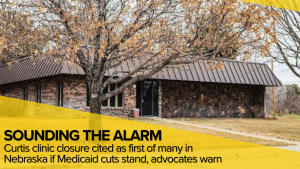Nebraska leaders and advocates are raising concerns about what they say are immediate and long-term consequences of federal budget cuts to healthcare and food assistance programs, following the recent closure announcement of a rural health clinic in Curtis, Nebraska.
During a press call hosted by Defend America Action, State Senator John Fredrickson and Nebraska Appleseed Healthcare Access Program Director Sarah Maresh spoke out against the budget bill passed by Congress last week. They argued that the legislation, supported by former President Donald Trump and Congressional Republicans, poses serious threats to healthcare access, especially in rural communities.
Rural Clinic Closure Highlights Medicaid Concerns
“We’ve had the announcement of the closure of a significant hospital and community health clinic in Curtis, Nebraska. That has real true implications on people’s lives,” said Sen. Fredrickson, who represents District 20 in Central West Omaha. “This is a huge concern and it’s certainly something that I fear we might continue to see as these cuts get into place.”
Fredrickson said the Curtis Medical Center specifically cited uncertainty around Medicaid funding as part of its decision to wind down services. He emphasized that Medicaid is the financial backbone for many rural hospitals and that the ripple effects of the federal cuts could also lead to higher private insurance premiums as providers attempt to offset lost revenue.
Tens of Thousands Could Lose Coverage
Maresh echoed those concerns and pointed to a broader picture of funding losses and health coverage reductions in Nebraska.
“Tens of thousands of Nebraskans are going to lose their healthcare coverage, and our state is going to lose billions in federal funding,” Maresh said. “We’ve seen estimates go up to as high as 78,000 Nebraskans losing coverage between Medicaid and marketplace plans.”
She added that nearly one in four Nebraskans rely on Medicaid or marketplace plans and that over 90,000 rural residents are covered by Medicaid alone.
Cuts Target Medicaid Expansion, Add Red Tape
According to Maresh, Nebraska could see a loss of $3 to $5 billion in federal healthcare funding under the bill. Specific cuts include work requirements for Medicaid recipients, new co-pays, more frequent eligibility checks, and the removal of coverage for certain populations, including children of refugees and trafficking survivors.
“These are just unnecessary, bad policy that we know will cause people to lose coverage,” Maresh said.
The bill also includes cuts to food assistance programs. Maresh said Nebraska’s administrative cost burden for SNAP (Supplemental Nutrition Assistance Program) is expected to rise, with a $13 million increase anticipated starting in 2026. While the state’s SNAP payment error rate is currently below the federal threshold that would trigger even greater cost-sharing, advocates warned that changes to federal funding structures still pose a major budget challenge.
Fredrickson said that while he and fellow lawmakers are discussing potential state-level responses, he does not anticipate a special session being called in Nebraska this year. He warned that state lawmakers will likely need to revise the budget during next year’s legislative session to account for the federal cuts.
“There’s a lot of work ahead. There’s a lot of concern that Nebraskans have,” he said. “It’s hard for me to envision or imagine cheering something like this on… There’s going to be really significant pain felt across the state.”
Rural Nebraska Hospitals Could Be Next
Maresh also noted that as more Nebraskans lose coverage, the burden of uncompensated care will likely rise. That could lead hospitals to pass on higher costs to patients with private insurance or to cut services altogether, especially in rural areas.
“It’s likely that six rural hospitals could close within two years after the final implementation of this bill,” she said, but did not indicate specific sites.
Both speakers warned that the combination of increased costs, service reductions, and loss of preventative care will have wide-reaching implications across the healthcare system, even for those not directly enrolled in Medicaid or marketplace coverage.
“Everyone’s going to feel the impacts,” Maresh said.




